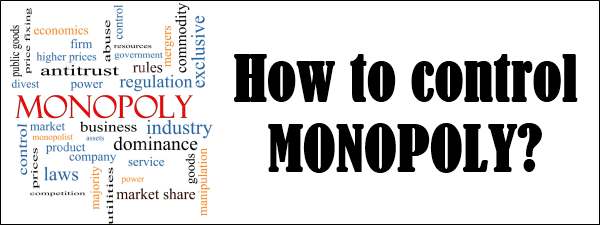How to control monopoly in economy?
Table of Contents
Control of Monopoly
Business Combinations might sometimes results in monopoly situations. Monopolies are not helpful for the social and economic development of a country. They result in concentration of economic power, profiteering and growth of unfair trade practices such as hoarding and black marketing.
Monopolies create entry barriers, try to eliminate competitors and prevent the entry of new firms. Consumers interests are greatly affected because of the growth of monopolies. They are forced to pay high prices for sub standard products as they do not have any other choice.
Monopolies are able to influence the economic policy of the country to suit their interests. This they achieve by bribing the political class. The interests of the monopoly business gain precedence over the national interest. Such actions affect growth and development of the economy. Therefore governments all over the world try to prevent and control monopolies in the national interest.

Measures taken to control monopoly in economy
The following are some of the measures taken by Governments to control monopoly in economy.
1. Anti monopoly legislation
Many countries of the world have enacted legislation to curb monopolies. In India the Monopolistic and Restrictive Trade Practices Act, 1969 was enacted to prevent monopolies. But legislation has had only a limited success in reducing the negative impact of monopolies.
2. Promoting fair competition
Competition ensures efficiency of firms and results in better quality, lower price and variety of choice to consumers. Therefore measures are taken to promote fair competition and prohibit unfair commercial practices. In India, the government has set up the Competition Commission to promote competition in all sectors of business.
3. Consumer associations
Unity is strength. Consumers unite and form consumers associations to protect and promote their interests. The consumer associations can fight against unfair trade practices, exploitation etc., In the developed countries, especially in the US, the consumer associations are very strong. In India, the consumer movement is not so strong because of lack of awareness among consumers regarding their rights.
4. Media publicity
Unfair and exploitative practices of combinations should be given wide publicity in media. Since media enjoys wide reach, it would create awareness among consumers about the wrongful acts of combinations. Such negative publicity would affect the sales and profitability of monopolistic combinations and would force them to adopt ethical business practices.
5. Governmental action
According to the noted economist, Joan Robinson, the government should impose taxes and provide subsidies.

